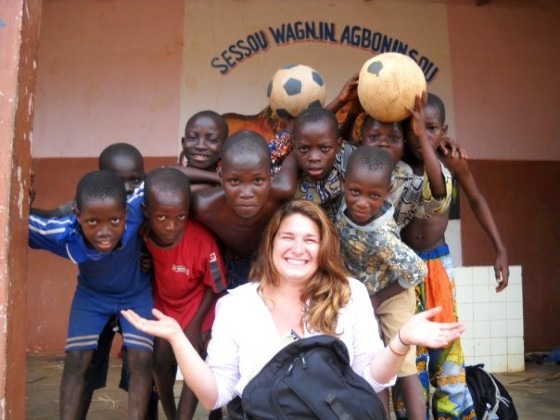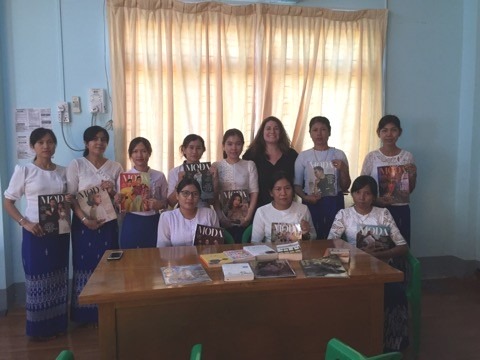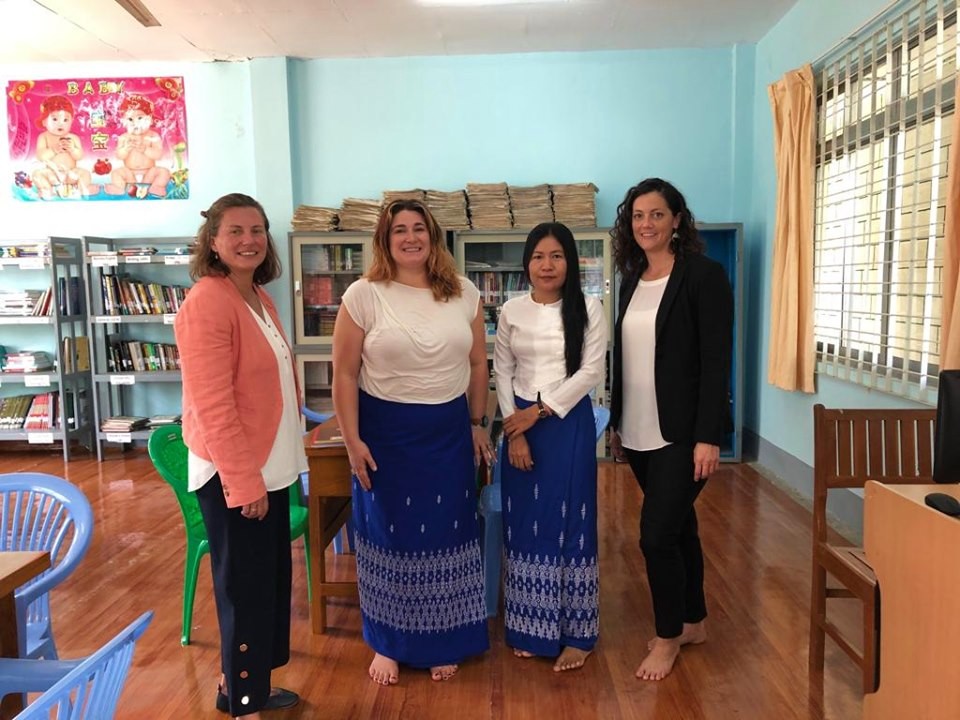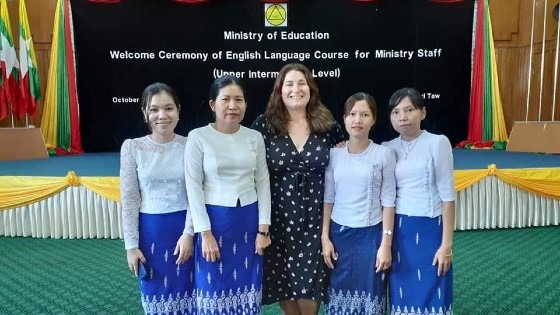A former member of the Peace Corps and U.S. Department of State English Language Fellow, Loren Lee Chiesi talked with us about her experiences teaching in West Africa, Turkey, and Morocco, and being an EL Fellow in Myanmar. She also shared how getting her Master’s in TESOL at the School for International Training (SIT), a Bridge MA TESOL Pathways Partner, shaped her teaching career.
You were in the Peace Corps in Benin, West Africa before completing your master’s degree in TESOL at SIT. Was it that experience that led to your decision to pursue teaching English?
So, my Bachelor’s degree was in English—specifically business and technical writing. So when I went into the Peace Corps, I already had years of experience being taught in English and being taught the mechanisms of the English language, and I just had to use it.
My Peace Corps experience made me realize that I loved being a teacher. And that wasn’t something that I was expecting because a lot of people had said, “What are you going to do with an English degree? Are you going to be an English teacher?” and I was like, “No, of course not! I’m going to do all of these other things! I’m going to be a writer. I’m going to be a publisher.”
But when I joined the Peace Corps, I was put into the teaching English as a foreign language sector, and I just realized pretty quickly into my placement at the school I was working at that I was out there waking up in the morning, opening my door to basically National Geographic. It was just dark and hot and really dry, and I had no electricity, no running water, but I was so excited to wake up and go to class. And it dawned on me: Oh my God, I might love this. This might be my reason for being alive. I’m really pumped to go see these students and get in the classroom and teach.
So after the Peace Corps, I did look into master’s programs and I had a lot of advice from different colleagues who I’d met along the way from the University of Delaware.
I quickly realized that SIT was coming to the top of the list of suggested places, and I’d never heard of it before because it’s just a tiny little program in Vermont and it wasn’t on my radar at all. But then, once I looked into it, I knew that this was probably the best decision for me to make as far as the quality of education and the type of program that it was.
I really liked the student-centered focus and working as a teacher and working on yourself first. How do you learn? How do you process? How do you teach best? What are different teaching strategies?
SIT was very practice-based. Make mistakes first and then reflect on them. Practice and reflect. Practice and reflect. And I feel like that gave me a really good foundation to go into teaching English professionally because I realized what I was pursuing was going to be a practice. Mastery was going to take decades, years, if I ever got to that point. The whole thing was going to be me learning and making mistakes along the way, so the best way I could react to that was by just constantly reflecting and seeing how I could improve and do better and what worked and why something didn’t work. And, really, reflecting isn’t just about making mistakes! Most of the time, a lesson either goes neutrally or great.
You also probably had a lot of success with your students when you were in the Peace Corps.
Yeah! And there are also certain things in the Peace Corps that I did that are absolutely not the best, and I didn’t realize it until later on.
An example is that I wear glasses, and I’ve worn glasses my entire life since I was six years old, so I didn’t realize why there was this pod of students in the back of the class who weren’t taking notes or participating. We didn’t have textbooks so everything had to be written on the board, and the students needed time to write everything down by hand. And these students just weren’t doing it. I finally asked them, “What is going on? Why won’t you take notes?” and they said, “Teacher, we can’t see the board,” and I thought, “Oh geez, that’s right! You don’t have access to glasses and you’ve never had your eyes checked. Of course! Duh!”
So, the next day when I went to class I decided to do this activity where I had everyone stand in a line and then I said, “Find a place in the room where you can see the writing on the board the best. It can be anywhere in the room.” There were certain people who came right to the front very close to me, and I realized that these were the ones who had eyesight problems. And there were other people who went all the way to the back, and I realized that their eyesight was pretty good. So it was a way for me to kind of have them self-diagnose, and then I could make changes on the seating based on that. And as soon as the seating was changed and they could see the board, they were participating.
There are tons of things that I didn’t maybe realize the first time around that through SIT I got to reflect on and which led me to become a better educator and a better person. I’ve always said that SIT was really great for me because for one year of education, I got therapy and a master’s degree and met my husband. So it was like the best investment of my life.

Loren with her students playing soccer after class during her Peace Corps training in Porto-Novo, Benin
I understand you met your husband at SIT?
Yes, I met my husband at SIT. He’s also an English teacher.
And is he with you in Myanmar?
Yes. We have the very unique experience of being, I believe, the only couple who has filled the same post right after each other for the English Language Fellows program. So my husband was the fellow last year, and I’ve since taken over his post.
I noticed that you taught in Morocco. Where were you in Morocco?
I was there for four years. I worked for Al Akhawayn University in Ifrane, which is about an hour’s drive from Fez into the Atlas Mountains. It’s actually in a place about two miles above sea level. And it was a ski resort town that was the former king of Morocco’s favorite place. He decided to build an English language University on the grounds.
And you also taught in Turkey?
I did. I taught one year in Turkey thanks to the TESOL International yearly conference—they have different companies and schools from around the world come and set up stands where you can conduct interviews. And SIT allowed us the week off to attend.
I spent most of my time at the TESOL conference just doing back-to-back interviews for different places that were interesting to me, and one was for this brand new university in Turkey. The idea of going to a brand new place that was fresh and being able to get in on the ground floor of an English language-dominant university in Turkey just seemed quite lovely. And then when I Googled Antalya, Turkey, the pictures that came up were phenomenal. It’s by the Mediterranean Sea and the beach and the mountains, and I said, “I think I can do this. I think I can handle a year of this.”
You taught university-level students there and in Morocco. What age did you teach in the Peace Corps?
In the small village where I lived in Benin, they just had a grammar school that was run on the French system, so it was pretty much everything from elementary to what we would call high school.
Everyone was together, but the way that the system worked, it wasn’t done by age, like it normally is in a French country. This was pay-as-you-go, so there were certain students whose families didn’t have enough money to send them until they were maybe 11, so they were in groups with younger kids or older kids. I had students from about 9 to 19 in my class because that was the level the students could get into and when they could start paying for classes.

Loren with ELPS teachers and director in the new library, accepting book and magazine donations
Most people don’t have that kind of experience, teaching many different levels and ages at once, and with limited resources. How did going into a master’s program later on change your perception of those experiences?
Yeah, but it was also my first classroom teaching experience. Before I joined the Peace Corps, I thought it would be a good idea if I had some experience teaching English so I did volunteer work at a local community center in my hometown that held English classes for people who were seeking U.S. citizenship.
I did basic English with them, and they were immigrants from all different parts of the world, and I did small group classes and individual tutoring and stuff like that. Just being able to meet different people and see how having little bits of English changed their lives, I realized, “Okay, I could definitely do this in Benin.”
Those were really my only two teaching experiences before I went into my master’s program, so I had no idea until I got my master’s degree how the education system worked or the different names for pedagogy. I had a lot of English linguistics and mechanisms and the metalanguage of teaching from my undergraduate degree, but I had no idea the different policies and stuff like that that were enacted until I got into my master’s program.
How long have you been in Myanmar now? You lived there previously in 2018, but did you return – or never leave?
I never left. What happened was that my husband and I, when we were in Morroco, went to the TESOL conference. I was a presenter and I met up with a friend of a friend who had joined the English Language Fellows program, and he just told me how great his experience was. I came home and said to my husband, “I think this is something we should look into. It looks like a really good opportunity and we have the experience and the qualifications to do it.”
So my husband and I both applied. What we decided was whoever got the first offer would go and the other person would follow. My husband got the offer to go to Myanmar and Burma and to live in Yangon and we took that offer, so I moved to Yangon as a traveling spouse first. And then the second year of the program, his location changed; they stopped the post in Yangon and they opened up the post in Naypyitaw. We jumped at the chance to relocate.
Naypyitaw is the new capital. It’s only about 11 years old. It’s a very interesting place in the world. I know that’s a big statement, but it is that unique.
Tell us about your current role there.
My office is based at the English Language Proficiency School of Naypyitaw, a small school that is funded by the Department of the Ministry of Education. It has its own director and works to help offer English classes to students of all ages. But my job there is to train the teachers at the English Language Proficiency school so they can better their teaching skills.
And then I also teach two days a week at the Ministry of Education, teaching English to Ministry staff from all different departments in Naypyitaw for administration purposes. For example, I teach them how to write grants, how to fill out forms, how to offer opinions, how to discern fact from opinion, and things like that.

Loren with Daw Nilar Win (the director of ELPS Naypyitaw), Jennifer Shuett (US DoS Cultural Affairs Officer), and Deb Lynn (US DoS Public Affairs Officer) on their site visit in Naypyitaw
How long have you been in Myanmar and when did your fellowship start?
I’m in my third year in Myanmar and my first year of the English Language Fellowship, which started September of 2019.
Do you speak the language?
I speak “market” Burmese. I know how to say hello, my name, that I’m a teacher, ask how much something costs, etc. but I am illiterate. I can’t read or write.
Do you think you and your husband will stay there after your English Fellows contract?
If I were offered for the position to be renewed, I would definitely take it. The fellowship is one 10-month contract and oftentimes, if you meet your expectations and they have a position open, they’ll offer you a second term. If I do get the second term, I will stay and so that will be four years here. I really do enjoy the work that I’m doing, and I really like the multifacetedness of it.
You’re working a lot of hours in this program. Is it full time or more than full time?
You know, it’s not a 40-hour-a-week job. It’s definitely less than 40 hours a week. I keep an office that I go to four days a week at the LPS that they have generously given me.
And then I do some weekend teacher observations every other weekend because the teachers work on the weekends. I use the skills that I learned at SIT on how to observe other teachers and how to have a reflective style of teaching. I use the three-point method where you look at what you did well, what you can improve for next time, and whether you want to use the lesson again or change it to make it better.
It’s a logical and easy method. The more complicated you make anything, the more intimidating it is. And I feel like even just doing a two-point reflection where you say both what went great and what needs improvement is really important for your self-confidence as a teacher. It’s important to ask, “What am I doing right? What did the students get? What did I react to? How did I handle that?” More often than not, because teaching tends to be more of a vocational occupation than just a job, having that reflective moment and that experience of being able to say “This is what I did well” is just as important as what you can improve.
It sounds like, after your program at SIT, you came away with strategies you could apply to your teaching in a tangible way?
I would love to say that I had anything to do with that, but it’s really the SIT process, that reflective training. Even my final portfolio was all just taking different things that I had done, different papers I’d written, and kind of reflecting on them and putting them against different principles that were the foundation of the program. So, I’ve often gone back and looked at my own portfolio notes and been like, “Okay, I can take this, I can take that.”
SIT also does a great job with its alumni in terms of keeping everyone in touch, and with Facebook and things like that, it’s really easy. I even had a group Facebook chat the other day with a bunch of the people who were in my MAT class. I said, “Hey, I’m doing a teacher training on how to put students into groups in creative ways. Does anyone have any good resources?” and people started just sharing ideas, so it was great. It’s a good way to keep in touch and keep everyone kind of motivated.






